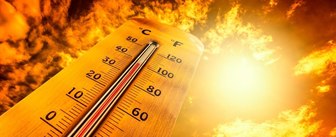This data was also used in the Yahoo News article, 'Climate change is leading many Americans to look for new places to live'
So much of everything in the U.S. has been politicized. YouGov surveys conducted over the past year or so have found big differences in the way Democrats and Republicans responded to the COVID–19 pandemic, including their willingness to wear masks and get vaccinated and whether Chinese scientists engineered COVID-19 in a lab from which it escaped. Partisans have also differed significantly on whether the storming of the U.S. Capitol was a threat to democracy and even in the way they rank the 50 states.
But the weather? Really?
Two recent surveys conducted by YouGov for Yahoo News in July and early August asked representative samples of Americans if they have “noticed more extreme events (heat waves, fires, storms, etc.) where you live?” Given a variety of recent weather and climate disasters, including the warmest June on record for the U.S., it’s not surprising that better than half (54%) say yes, they have noticed more extreme weather events. Two in five (38%) say no and 7% are unsure.
What is perhaps more surprising – or perhaps not – is the apparent influence of politics on their answers: nationwide, 72% of Democrats and Democratic leaners say they have noticed extreme weather events in their area compared to just 36% of Republicans and Republican leaners. Republicans are more than twice as likely to say they have not noticed extreme weather events (60%) than Democrats (22%).
The question does ask about weather “where you live,” so we took the analysis one step further and looked at a subgroup of 14 states for which 2021 was their warmest June on record (Arizona, California, Idaho, Massachusetts, Nevada, New Hampshire, Rhode Island and Utah) or their second warmest June ever (Connecticut, Maine, Montana, Oregon, Washington and Wyoming), according to the National Oceanic and Atmospheric Administration (NOAA).
Sure enough, those in the 14 states hit hardest by the recent heat wave are more likely to report noticing more extreme weather events (67%) than Americans living in the other 36 states or Washington D.C. (50%).
Either way, however, the impact of politics persists. Democrats are more likely than Republicans to report noticing extreme weather in both the 14 heat wave states (78% vs. 49%) and elsewhere in the U.S. (70% vs 33%). Even in the states bearing the brunt of the record-setting heat wave, 48% of Republicans say they have not noticed more extreme weather events where they live.
These results were stable across the two surveys except for one subgroup: Republicans living in the 14 heat wave states said they noticed extreme weather events more often in the first survey conducted July 13-15 (56%) than in the second conducted just three weeks later, July 30-August 2 (42%). Over the same period, the number of Democrats who noticed extreme weather events was essentially unchanged — 79% on the first survey and 77% on the second.
This sort of analysis is obviously not exact. State borders provide only a crude method of identifying extreme weather impact – much of the country experienced at least higher than average temperatures in June – and there have been other extreme weather events in 2021 beyond the heat wave. A series of severe storms that included flooding tornadoes, hail and high wind damage did more than $1 billion in damage, according to NOAA, much of it in areas of the country that did not experience record-setting high heat. And, of course, whether any given person perceives these events as “extreme” is inherently subjective.
There is also the issue of expressive responding. It is possible, perhaps even likely, that much of the hesitation (or eagerness) to label recent weather patterns as “extreme” is less a difference in perception than a way for some survey respondents to show support for their political side.
Either way, whether a true difference in perception or the way some Americans now respond to questions about current events, the results are a sad commentary on the state of our politics.
See the July and August crosstabs from these Yahoo News/YouGov Polls
Related: Many Americans feel recent effects of climate change, others are not so sure
Methodology: The Yahoo! News survey was conducted by YouGov using a nationally representative sample of 1,715 U.S. adults interviewed online between July 13-15, 2021 and 1,552 U.S. Adults interviewed online between July 30-August 2, 2021. These samples were weighted according to gender, age, race, and education based on the American Community Survey, conducted by the U.S. Bureau of the Census, as well as 2020 Presidential vote (or non vote), and voter registration status. Respondents were selected from YouGov’s opt-in panel to be representative of all U.S. adults. The margin of error for both surveys is 2.7%
Image: Photo by Maggie Zhan from Pexels










